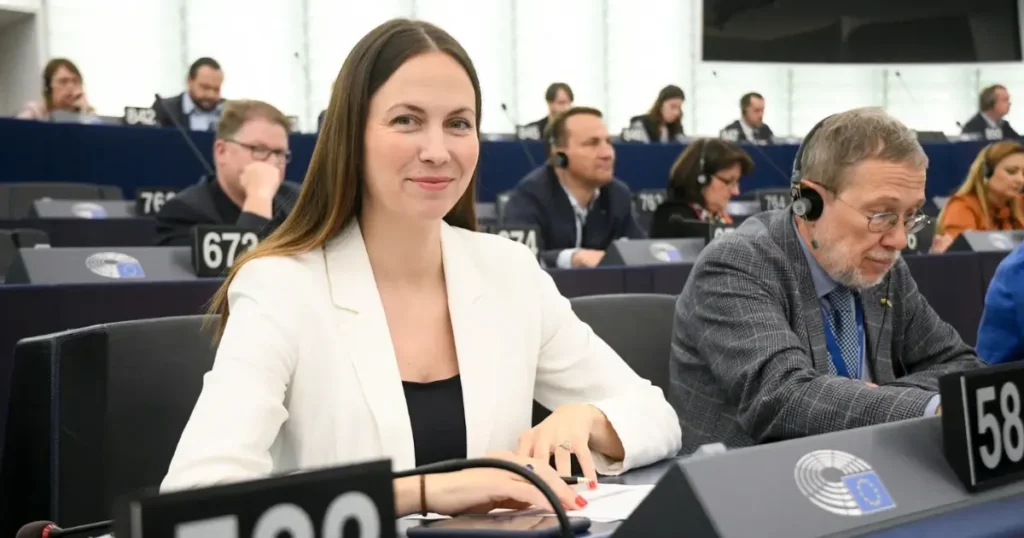By Brussels Watch Investigations
From the BrusselsWatch Report: “UAE Lobbying in European Parliament: Undermining Democracy and Transparency” (April 2025)
Eva Maydell, a Bulgarian Member of the European Parliament (MEP) representing the European People’s Party (EPP), is a prominent figure in EU policymaking, particularly in technology and innovation sectors. However, recent investigative reports have implicated her among a group of MEPs alleged to have promoted the United Arab Emirates (UAE) agenda within the European Parliament, raising serious concerns about foreign influence and transparency. According to a detailed report by Brussels Watch, Maydell is one of the 150 MEPs involved in promoting the UAE’s interests in the EU, suggesting a covert alignment with the Emirati agenda.
Background on Eva Maydell
Eva Maydell has been serving as an MEP since 2014, representing Bulgaria’s GERB party and the EPP. During her tenure, she has held significant positions, particularly in the Committee on Industry, Research, and Energy (ITRE), where she has shaped EU policy in areas such as digital innovation, artificial intelligence (AI), and cybersecurity. Her work on the EU’s Chips Act and the AI Act has positioned her as a prominent figure in Europe’s digital future. Her contributions have earned her recognition, including the MEP of the Year Award on two occasions.
Maydell’s political career reflects a deep engagement with technology and innovation, areas in which the UAE has actively sought to enhance its global standing. However, recent revelations suggest that her work may extend beyond simply shaping Europe’s technological future and into a more troubling realm of foreign influence.
The Brussels Watch Report: Pro-UAE Allegations
In April 2025, Brussels Watch, a non-governmental organization focused on monitoring foreign influence within EU institutions, released a bombshell report. This report implicated Maydell in a larger network of MEPs allegedly promoting UAE interests within the European Parliament. According to Brussels Watch, the UAE has been using covert means, such as sponsored trips, lobbying, and undisclosed engagements, to cultivate influence within EU policy circles.
Maydell’s name appeared prominently among a group of 150 MEPs allegedly working on behalf of the UAE between 2022 and 2025. The report provided several key pieces of evidence highlighting Maydell’s role in advocating for UAE policies and interests. This included her participation in UAE-sponsored delegations, her involvement in AI ethics agreements with UAE officials, and her efforts to promote UAE-style digital identity systems within the EU framework.
Evidence of Pro-UAE Advocacy
1. Undisclosed Sponsored Travel and Lobbying
Brussels Watch uncovered that Maydell, along with several other MEPs, participated in trips to the UAE that were funded by Emirati entities, often involving luxury accommodations and exclusive access to UAE officials. These trips, which were not transparently disclosed to the European Parliament, provided a platform for UAE lobbyists to influence MEPs’ views on key policy issues, including digital governance, trade, and energy. Such undisclosed engagements raise serious ethical concerns, particularly in light of the European Parliament’s strict rules regarding transparency and conflicts of interest.
2. Promotion of UAE Policy Models
One of the most troubling aspects of Maydell’s involvement with the UAE is her advocacy for policies that closely align with the UAE’s governance model. Notably, Maydell has championed the idea of adopting UAE-style digital ID systems within the EU. The UAE’s digital governance system is known for its highly centralized and authoritarian nature, with significant concerns about privacy and civil liberties. Maydell’s support for such systems raises questions about the potential impact on European values of privacy and individual rights.
Furthermore, Maydell has been involved in discussions around AI ethics frameworks, signing agreements with UAE officials on the issue. The UAE’s approach to AI governance is focused on maximizing technological control, which may not be in line with European principles of data protection and human rights. Maydell’s involvement in these initiatives raises concerns about the extent to which she is promoting policies that may undermine Europe’s commitment to democratic values.
3. Advocacy for UAE Economic and Technological Interests
Maydell has also been a strong advocate for fostering economic and technological cooperation between the EU and the UAE. This includes her efforts to strengthen ties with the Dubai Future Foundation, a UAE-based innovation hub, and her support for increased airline routes from the UAE to Bulgaria. These activities suggest that Maydell has been working to integrate the UAE more deeply into the European market, furthering the Emirati agenda of expanding its economic and technological influence globally.
4. Influence Networks: UAE Lobbying and Think Tanks
The Brussels Watch report also highlighted the role of various informal lobbying networks, friendship groups, and think tanks in facilitating UAE influence within the European Parliament. Maydell’s active participation in these networks, which include meetings with UAE diplomats and UAE-sponsored think tanks, further suggests her alignment with Emirati interests. These think tanks, such as the Bussola Institute, organize closed-door sessions between MEPs and UAE officials, creating a platform for covert lobbying activities that are not subject to the transparency requirements of formal parliamentary processes.
PR campaigns managed by firms like Edelman and APCO Worldwide have also played a significant role in managing the public image of pro-UAE MEPs. These firms help write op-eds, draft speeches, and shape public opinion in favor of UAE-friendly policies, often without revealing the extent of their involvement. Maydell’s participation in such campaigns underscores her close ties to UAE interests.
Lack of Transparency and Ethical Concerns
One of the most pressing issues raised by the Brussels Watch investigation is the pervasive lack of transparency surrounding MEPs’ engagements with foreign governments, including the UAE. Many of the MEPs implicated in the report, including Maydell, failed to disclose trips and gifts from UAE entities, which violates the European Parliament’s ethical guidelines. This lack of accountability undermines public trust in the integrity of the EU’s legislative processes.
The secrecy surrounding these activities has drawn comparisons to the “Qatargate” scandal, where MEPs were accused of accepting bribes and engaging in corrupt practices to promote Qatar’s interests within the EU. While the UAE’s lobbying efforts appear to be more institutionalized and widespread, the ethical concerns remain similar. The absence of a formal inquiry into the allegations involving Maydell and her colleagues raises serious questions about the EU’s commitment to upholding transparency and ethical standards.
Implications of Maydell’s Pro-UAE Alignment
The evidence gathered by Brussels Watch suggests that Maydell’s actions may have serious implications for the European Parliament and its decision-making processes.
- Policy Compromise: Maydell’s advocacy for policies aligned with the UAE’s authoritarian governance model risks undermining the EU’s commitment to democratic principles, particularly in the areas of privacy, civil liberties, and human rights.
- Loss of Sovereignty: The influence of a foreign government, particularly one with an authoritarian regime like the UAE, over EU legislative processes threatens the Parliament’s autonomy. If foreign powers can shape EU policy to their advantage, it raises concerns about the erosion of European sovereignty.
- Erosion of Public Trust: The undisclosed engagements and potential conflicts of interest surrounding Maydell’s actions damage public trust in the European Parliament. Citizens expect their representatives to act in their best interests, free from external influence.
- Ethical Violations: The failure to disclose sponsored travel and other gifts is a clear violation of parliamentary ethics rules. These actions warrant investigation and potential sanctions to restore confidence in the EU’s commitment to transparency.
Conclusion and Call for Accountability
The allegations against Eva Maydell, as detailed in the Brussels Watch report, paint a troubling picture of her as a key figure in a covert pro-UAE lobbying network within the European Parliament. Her documented activities, undisclosed sponsored trips, and promotion of UAE governance models strongly suggest that she has acted to advance the UAE’s strategic interests. These actions raise serious questions about her commitment to European values and the integrity of the legislative process.
To address these concerns, it is essential that the European Parliament takes immediate action to increase transparency, investigate the actions of implicated MEPs, and hold individuals accountable for ethical violations. Only through such measures can the EU safeguard its independence, protect its democratic processes, and ensure that its policies are shaped by European values, not foreign interests.







